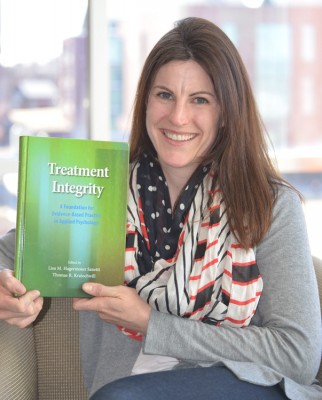Holding her new book Treatment Integrity: A Foundation for Evidence-Based Practice in Applied Psychology, Dr. Lisa M. Hagermoser Sanetti was relieved and proud to show off the “exciting” results of a four-year project.
An associate professor in school psychology at the Neag School, Sanetti said she always hoped to write a book reviewing the theoretical and practical developments related to implementation of evidence-based interventions from across different fields, with a focus on psychology and education.
“I’ve been interested in bringing all these pieces together. The field of implementation science has been growing fast but previously ignored in the psychology and education literature,” said Sanetti, also a research scientist with the Center for Behavioral Education and Research.
Co-written by Dr. Thomas R. Kratochwill at the University of Wisconsin–Madison, the book is “the first comprehensive source” on the conceptualization, assessment, and promotion of treatment integrity across psychology, education, health services and related fields, she said.
Over the past century, both the theory and science of treatment of those who experience social, emotional and behavioral problems have evolved significantly, explain Sanetti and Kratochwill in the book’s introduction. There are now numerous interventions that have lots of empirical support for their effectiveness. Over the past two decades, they report, the focus has shifted from identifying what treatment is effective to figuring out how to get the effective treatment implemented. This is the concept of treatment integrity, ensuring that an evidence-based treatment is implemented as intended to achieve positive outcomes.
Consisting of four primary sections, the book presents a broad view on “what is known and what is not yet known about the implementation of evidence-based interventions,” including the development of conceptual models related to treatment integrity across different fields.
One of the most inspiring aspects of crafting and editing this book was the experience of “building each chapter with leading researchers” known for cutting-edge work on treatment integrity in their respective fields, Sanetti said.
“We have physicians who have done in-depth work on intervention implementation but do not know how their practices can apply to education,” Sanetti said. In addition, she added that this book includes the first comprehensive look at legal and ethical issues related to treatment integrity. “I’m glad we were able to incorporate and disseminate this knowledge to a whole new audience.”
A recipient of the American Psychological Association’s 2012 Lightner Witmer Award for her work on treatment integrity of intervention implementation, Sanetti said her research interests date back to working in an child psychiatry outpatient clinic before going to graduate school: “I remember seeing families coming in whose children were prescribed medication, probably the simplest medical intervention, and even implementing that was not consistent,” Sanetti said. “And that’s when I started thinking.”
“In comparison, what we do in education psychology is way more complicated,” she continued, recalling her work as a behavioral consultant for schools in Massachusetts and Connecticut before joining the UConn faculty. “At any time, you might have four or five children with academic, behavioral, and/or mental health issues who need individual interventions. I saw teachers struggling with how to implement effective practices, knowing that their practices weren’t consistent. They were not getting enough support to make helping those children easier.”
Sanetti hopes her book will provide psychologists, educators, social workers, counselors, speech-language pathologists, and administrators with the information they need to develop a foundational knowledge of treatment integrity, identify treatment integrity assessment methods, and promote higher levels of treatment integrity using approaches appropriate for their respective practices.
Developing treatment integrity for community-based prevention programs, in which community members volunteer at after-school programs, are among the interventions discussed. “There are different strategies for community members working in a community setting, verse clinical psychologists working a therapeutic setting,” Sanetti explained. “The variety of approaches adds to the complexity of how you measure and promote treatment integrity.”
The author of more than 20 school psychology articles, book chapters and journal articles, Sanetti believes the biggest need in improving this field is the continued development of treatment integrity assessment.
“Without appropriate assessment methods, you don’t really know when you need to provide support to promote higher levels of implementation to achieve greater intervention effectiveness,” she said. “There has been an explosion of research in this area over the past decade, but there is still so much work to be done. I’m excited we are heading into the right direction.”



